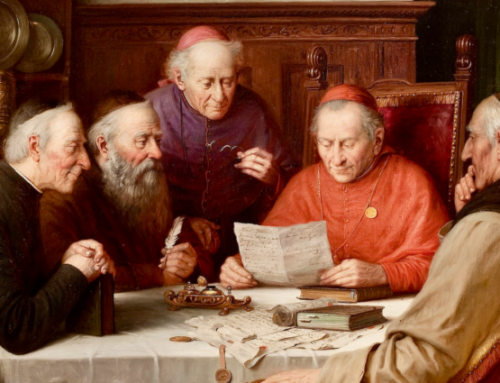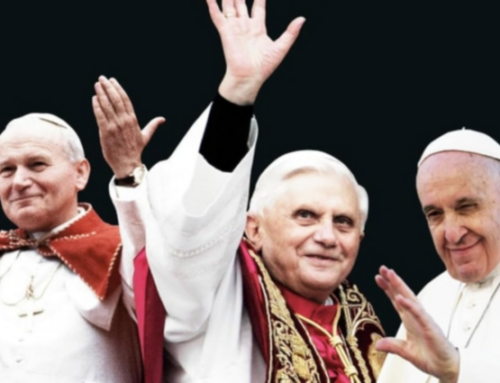People who read books of this kind usually expect the author to answer the question: “Why did you become a Roman Catholic?” I am not trying to explain it, but I must try to illustrate it by an example. It was as if I had been a man homeless and needing shelter, who first of all had taken refuge under a shed at the back of an empty house.
A Spiritual Aeneid, by Ronald Knox (270 pages, Cluny Media)
 People who read books of this kind usually expect the author to answer the question: “Why did you become a Roman Catholic?” I must distinguish (after the tradition of my Oxford upbringing) with the answer: “It depends what you mean by Why.” If you ask of a friend, “Why did he marry that woman?” you may mean: “Why did he marry at all?” or: “Why did he choose that wife?”; you may mean: “Why did he fall in love with her?” or: “Why did he not fall out of love with her?” or simply: “Why did he lead her to the altar?” Similarly, in this case, you may be asking me: “Why did you not remain an Evangelical?” or: “Why did you not remain a High Churchman?” or: “Why did you not remain an extreme Sacramentalist?” or you may mean: “Why did you adopt Catholicism rather than any other religion?” or: “Why did you adopt a religion at all?”
People who read books of this kind usually expect the author to answer the question: “Why did you become a Roman Catholic?” I must distinguish (after the tradition of my Oxford upbringing) with the answer: “It depends what you mean by Why.” If you ask of a friend, “Why did he marry that woman?” you may mean: “Why did he marry at all?” or: “Why did he choose that wife?”; you may mean: “Why did he fall in love with her?” or: “Why did he not fall out of love with her?” or simply: “Why did he lead her to the altar?” Similarly, in this case, you may be asking me: “Why did you not remain an Evangelical?” or: “Why did you not remain a High Churchman?” or: “Why did you not remain an extreme Sacramentalist?” or you may mean: “Why did you adopt Catholicism rather than any other religion?” or: “Why did you adopt a religion at all?”
These last two questions would involve a series of handbooks, and I am afraid I must leave them out of consideration. At no time of my life have I desired anything else in the way of religion than membership in the body of people which Jesus Christ left to succeed Him when He was taken up from our earth. Until the age of fifteen I believed (without troubling myself with much speculation) in the Blessed Trinity, the Incarnation, the Life, Death, Resurrection, and Ascension of our Saviour, Heaven, Hell, and the forgiveness of our sins only through the atoning merits of the Precious Blood. I have never ceased to believe in these things, though later I experienced general temptations against the Faith, and found my way to the combating of them. At Eton I learned to value other doctrines besides—the idea of a continuous ministry unifying the long series of Church history, of special graces attached to various Sacraments and sacramentals; I learned to think of Church traditions as possessing a special claim on the Christian’s obedience, of beauty and mystery, expressed in outward show, as part of the natural atmosphere in which a man worships his God. I have never ceased to believe in these things. At Oxford I learnt more definitely to attach a miraculous (that is, what unbelievers call a “magical”) efficacy to the Sacrament of Holy Eucharist; to approach and ask the aid of God’s Saints as my friends and patrons; to assert the endowment of his Mother with special and excellent gifts; to think of the Bishops of Rome as the successors to Peter’s position among his fellow apostles and as the first Bishop of Christendom. Later, I came to regard the Bishop of Rome not merely as the Primate, but the natural administrative Head and doctrinal Teacher of Christians, however much historical circumstances might cut me off from his communion. I have never ceased to believe in these things. So far as religion goes, I do not know that I ever actually ceased to believe in anything.
But, during those two years and more of spiritual exile I did come to wonder whether I had a right to believe in anything—to believe, that is, without being in visible Communion with that one visible Body of faithful people of whom the prophet foretold, “All thy people shall be taught of God.” For authority played a large part in my belief, and I could not now find that any certain source of authority was available outside the pale of the Roman Catholic Church. Once inside, I should not care how the authority came to me; I did not crave for infallible decrees; I wanted to be certain I belonged to that Church of which Saint Paul said proudly, “We have the Mind of Christ.” I was by this time unable to believe that I was already in the Church—it was not that I had ceased to believe anything, but that I had a more exacting idea of what “being inside the Church” meant. Now, either I must accept this fuller idea, with all the corollaries it involved in the way of spiritual submission and worldly resignation, or I must give up all positive basis for my religion.…
 My feeling was this. I had by now become so tired with my buffeting against the waves of difficulty that I hardly knew whether I believed in anything; whether I must not embrace my second alternative, and give up asserting supernatural religion altogether. That first Sunday morning, for example, I read some chapters of Faber’s Creator and Creature, and my spiritual appetite seemed to revolt against it. “That,” I told myself, “is the real trouble: it is not the Pope, or indulgences, or infallibility; you do not really believe in God as the Catholics do. If you can steadily face all this mountain of assertion about the greatness of God in comparison with man, you may be a Catholic yet—but can you?” Now, my retreat should be my experimentum crucis. If my acts (of resignation especially) during my retreat should result, as they well might, in revulsion from the whole thought of religion, then, for this time at least, I would own myself defeated. But if in the making of them I found that religion was still a real world to me, that my soul still functioned (after two years of vague aspiration and spiritual numbness) as a soul made to serve its Creator and to no other end, then it was all right. Then I would enter the Kingdom of Heaven as a little child; it was close to my hand.
My feeling was this. I had by now become so tired with my buffeting against the waves of difficulty that I hardly knew whether I believed in anything; whether I must not embrace my second alternative, and give up asserting supernatural religion altogether. That first Sunday morning, for example, I read some chapters of Faber’s Creator and Creature, and my spiritual appetite seemed to revolt against it. “That,” I told myself, “is the real trouble: it is not the Pope, or indulgences, or infallibility; you do not really believe in God as the Catholics do. If you can steadily face all this mountain of assertion about the greatness of God in comparison with man, you may be a Catholic yet—but can you?” Now, my retreat should be my experimentum crucis. If my acts (of resignation especially) during my retreat should result, as they well might, in revulsion from the whole thought of religion, then, for this time at least, I would own myself defeated. But if in the making of them I found that religion was still a real world to me, that my soul still functioned (after two years of vague aspiration and spiritual numbness) as a soul made to serve its Creator and to no other end, then it was all right. Then I would enter the Kingdom of Heaven as a little child; it was close to my hand.
Well before the end of my first week, I knew that grace had triumphed. I neither expected nor received any sensible supernatural illumination: I did not have to take my spiritual temperature, “evaluate” my “experiences,” or proceed in any such quasi-scientific manner. I turned away from the emotional as far as possible, and devoted myself singly to the resignation of my will to God’s will. Attulit et nobis aliquando optantibus aetas Adventum auxiliumque Dei; in the mere practice of religion, in the mere performance of these (very informal) exercises, I knew that it was all right.
I am not trying to explain it, but I must try to illustrate it by an example. It was as if I had been a man homeless and needing shelter, who first of all had taken refuge under a shed at the back of an empty house. Then he had found an outhouse unlocked, and felt more cheerfulness and comfort there. Then he had tried a door in the building itself, and, by some art, found a secret spring which let you in at the back door; nightly thenceforward he had visited this back part of the house, more roomy than anything he had yet experienced, and giving, through a little crack, a view into the wide spaces of the house itself beyond. Then, one night, he had tried the spring, and the door had refused to open. The button could still be pushed, but it was followed by no sound of groaning hinges. Baffled, and unable now to content himself with shed or outhouse, he had wandered round and round the house, looking enviously at its frowning fastnesses. And then he tried the front door, and found that it had been open all the time.…
This essay serves as the Epilogue to A Spiritual Aeneid.
Republished with gracious permission from Cluny Media.
The Imaginative Conservative applies the principle of appreciation to the discussion of culture and politics—we approach dialogue with magnanimity rather than with mere civility. Will you help us remain a refreshing oasis in the increasingly contentious arena of modern discourse? Please consider donating now.
The featured image is “Lake Avernus- Aeneas and the Cumaean Sybil” (1814 or 1815) by Joseph Mallord William Turner, and is in the public domain, courtesy of Wikimedia Commons.







What a wonderful closing analogy!